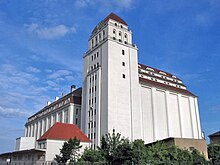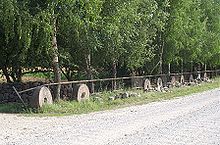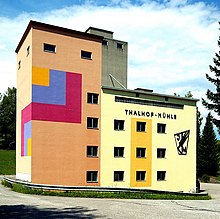Mill

A mill ( Old High German muli ; from Latin molina or Latin molere for grinding) is a system, a machine or a device to crush lumpy feed material into a fine or finely grained end product. Therefore, apart from a shredding device, there is often a device for size separation ( sieving , sifting ). If the requirements for the degree of fineness of the end product are lower, crushers are used for size reduction.
Historically, the term mill is used in a broader sense for commercial systems that are operated with wind or water power ( paper mill , sawmill , stone mill ).
All technical processes (acceptance, cleaning, grinding , sifting, transport , storage, packaging) are summarized under the term milling technology . Teaching and research on mills and milling (terminology, technology, ecology, ethnology, economics, history, law, protection, conservation and restoration and their aesthetic values) is called molinology .
history
The history of the mills
Millstones were part of the Mesolithic culture even before the transition to a productive economy ( Neolithic ) . The already well-known mortar was later replaced by hand-operated rotary mills. In Roman times, large mills ( Göpel ) are known from Pompeii , for example , which were operated with mules . Hydropower has been used since Roman times. The Roman engineer Vitruvius planned the mills, for example the Karlsmühle as a stone mill for cutting marble blocks on the Ruwer near Trier / Mosel . According to Örjan Wikander, the Karlsmühle is the oldest mill north of the Alps . A water mill from the Merovingian era was discovered in 1993 in the Paartal near Dasing; it is from the year 744 AD. Another early mill is from 833 AD; it was excavated in the Rotbachtal near Erftstadt-Niederberg. Wind power has been used since the Middle Ages .
- Developments in the history of the mill
First mechanical mill, developed by Oliver Evans in the 18th century
Schapfenmühle with one of the highest silos in the world, built in 1985
Important people in the history of the mill
- Vitruvius (1st century BC)
- Johann Niclas Müller (1689–1732)
- Oliver Evans (1755-1819)
- Heinrich Auer (1825-1892)
Classification of the mills
According to the type of company
According to the products (modern classification)

- Wire drawing mill (historical)
- Iron mill (historical)
- Ore mill (historical), see also: Pochwerk
- Color wood mill (historical)
- Paint mill (modern)
- Flax mill for the production of linen (historical)
- Rock mill (modern)
- Flour mill (modern)
- Spice mill , e.g. B. pepper mill (modern)
- Coffee grinder (modern)
- Bone mill (historical)
- Coal mill (modern)
- Krappmühle (historical)
- Chalk mill (historical)
- Ball , Marbel- , Marble Mill (historical)
- Copper mill (historical)
- Lohmühle (historical)
- Mass mill (historical)
- Fruit mill (e.g. apple mill ) (modern)
- Oil mill (modern)
- Paper mill (historical)
- Powder mill for the production of gunpowder (historical)
- Rätzmühle , vegetable processing
- Grater (grater, Ribi) for squeezing the hemp stalks (historical, Switzerland)
- Sawmill (historic)
- Sand mill for the production of house sand and scouring sand (historical)
- Salt mill (modern)
- Peeling mill (modern)
- Scrubbing mill
- Grinding mill (historical)
- Snuff mill (historical)
- Water mill or wind pumps for pumping water (driven by wind power, historically)
- Vibrating mill
- Silk thread mill or silk mill (historic)
- Mustard mill (historical)
- Stone mill (historic)
- Waidmühle for the production of textile dye (historical)
- Fulling mill during cloth production (historical)
- Chicory mill (historical)
- Sugar mill (historical)
According to the type of construction (modern division)
- Asima mill
- Hammer mill (technology)
- Colloid mill
- Corundum mill
- Ball mill
- Grinding mill (historical)
- Mortar grinder
- Planetary mill
- Impact mill
- Tube mill (technology)
- Rotor mill
- Disk mill
- Granulator
- Vibrating mill
- Jet mill
- Drum mill
- Vertical mill
- Roller mill
- Whirlwind-Mill
According to the type of drive (historical classification)
Propulsion by muscle power (humans / animals)

-
Millstone
- Rubbing stone, also called saddle mill
- mortar
- Field mill / wagon mill
- Göpelmühlen (animal drive)
-
Treadmills
- Scrubbing mill ( scrubbing mill Jordhamn )
- Grinding mill
Propulsion by hydropower
-
Watermill , depending on the inlet height with an upper, middle or undershot water wheel
- horizontal
- vertical
- Ship mills (also: ship mill ) - a stationary ship is propelled by water flowing past it
- Tide mills
Propulsion by wind power
-
Windmills
- Post mill
- Paltrock windmill
- Dutch windmill
- Coker windmill
- Horizontal mill (wind)
- Barn mills
- Roof mills
Propulsion by engine power
particularities
Undershot weir mill Bagas
Wehrmühle Dinkelsbühl was integrated into the former city fortifications
Historic Eulschirbenmühle in a castle-like building
tourism
- Westfälische Mühlenstraße - the first of its kind in the East Westphalian district of Minden-Lübbecke , connects 42 wind, water and horse mills.
- Mühlenstraße Oberschwaben - 100 mills in Oberschwaben in detail with photos and maps
- Lower Saxony Mill Road - 301 mills in Lower Saxony
- Mill trail in the Swabian Forest
- Numerous mill shapes can be found in the “ Mill Museum ” in Gifhorn (Lower Saxony).
Mill day
- German Mill Day : Annually on Whit Monday - nationwide (directory of participants at the German Society for Mill Maintenance and Milling Studies (DGM) ).
- Dutch Mill Day: Every year on Whitsun.
- Swiss Mill Day: Every Saturday after Ascension Day (Ascension Day). Directory of participants can be found on the website of the Association of Swiss Mill Friends VSM.
- TIMS - International Milling Symposia
literature
- chronologically ascending
German-speaking area, Europe and the world
- Johann Matthias Beyer: Theatrum machinarum molarium, or the arena of mill construction (= Jacob Leupolds [founder]: Theatro machinarum . 9th part). 3 volumes, new, increased edition, Waltherische Hof-Buchhandlung, Dresden 1767/1788 ( digitized in the University and State Library Düsseldorf ).
- Johann Matthias Beyer: The scene of mill architecture . Waltherische Hof-Buchhandlung, Dresden 1803. (1st edition, Leipzig 1735).
- D. Johann Georg Krünitz: Economic encyclopedia or general system of the state, city, house and Agriculture in alphabetical order. Part five and ninety: mills. Bookseller Joachim Pauli, Berlin 1804.
- Johannes Mager , Günter Meißner, Wolfgang Orf: The cultural history of the mills . Edition Leipzig, Leipzig 1988. ISBN 978-3-361-00208-1 .
- Johannes Mager: Mill wing and water wheel. Mills and lifts for water and brine . 2nd edition, Fachbuchverlag, Leipzig 1990, ISBN 978-3-343-00257-3 .
- Heinrich Herzberg: The mill between religion and superstition . Verlag für Bauwesen, Berlin 1994, ISBN 3-345-00574-3 .
- Eugen Ernst: Mills through the ages . Theiss, Stuttgart 2005, ISBN 978-3-8062-1935-7 .
- Adam Lucas: Wind, Water, Work. Ancient and Medieval Milling Technology (= Technology and Change in History. Volume 8). Koninklijke Brill, Leiden / Boston 2006, ISBN 90-04-14649-0 (social and technical aspects of medieval milling).
- Jürgen Gaebeler: The early history of the sawmills as a result of mill diversification . 2nd, expanded and revised edition, Kessel Verlag, Remagen 2006, ISBN 3-935638-20-5 .
- Klaus Grewe: The relief representation of an ancient stone saw machine from Hierapolis in Phrygia and its significance for the history of technology . In: Martin Bachmann (ed.): Construction technology in ancient and pre-ancient Asia Minor . International conference 13. – 16. June 2007 in Istanbul (= publications of the German Archaeological Institute Istanbul . Volume 9). Byzas, Istanbul 2009, ISBN 978-975-8072-23-1 , pp. 429–454 ( full text ( Memento from May 11, 2011 in the Internet Archive ) [PDF; 2.0 MB; accessed on January 5, 2019]) .
- Carl Friedrich Ganzel, Friedrich Wulff: The Quest for American Milling Secrets . Ed .: Derek Ogden, International Molinological Society. Congleton 2010, ISBN 978-92-9134-025-5 (American milling and flour production).
- Wolfgang Kuhlmann: water, wind and muscle power. The flour mill in legends and facts . Ed .: German Society for Milling Customers and Mill Maintenance . Petershagen-Frille 2012, ISBN 978-3-00-037659-7 .
- Philipp Oppermann, Torsten Rüdinger: Small mill customer. German history of technology from the friction stone to the industrial mill . 2nd, revised and updated edition, Edition Terra, Berlin 2012, ISBN 978-3-9811626-7-7 .
- Werner Schnelle (author), Rüdiger Hagen (editing): Mill construction. Preserve and preserve water wheels and windmills . Ed .: German Institute for Standardization . 2nd, revised edition, Beuth Verlag, Berlin / Vienna / Zurich 2012, ISBN 978-3-410-21342-0 .
- Burghard Kirsch, Alois Odenthal: Specialized mathematics of milling technology . 7th edition, Bayerischer Müllerbund, Munich 2013, ISBN 978-3-9812436-4-2 .
Individual regions
- Helmut Düntzsch, Rudolf Tschiersch, Eberhard Wächtler , Otfried Wagenbreth : Mills. History of the flour mills. Technical monuments in Central and Eastern Germany . German publishing house for basic industry, Leipzig / Stuttgart 1994, ISBN 3-342-00672-2 .
- Karl Schumacher: The mills in the Heisterbach Valley - How they rattled from the Middle Ages to modern times. Water management, historical development, mill technology, legends and poems, principle site plan . Ed .: Heimatverein Oberdollendorf and Römlinghoven, 2nd, reviewed edition, Königswinter 2011, DNB 1021390569 .
- Birgit Poppe, Klaus Silla: Windmills on the Lower Rhine . Mercator, Duisburg 2014, ISBN 978-3-87463-540-0 .
- Detlef Schnell: Mills and hydropower plants in Pomerania . Edition Pommern, Elmenhorst in Vorpommern 2018, ISBN 978-3-939680-46-8 .
Individual evidence
- ↑ Autumn Letter. Retrieved January 23, 2010 ( Memento of May 15, 2005 in the Internet Archive ).
- ↑ Mill research. Retrieved January 23, 2010 ( MS Word ; 32 kB)
- ↑ Georg Abröll: Mill of the late Merovingian period in Dasing (Gem. Dasing). In: Bezirksheimatpflege Schwaben (Ed.): Mühlen in Schwaben. Documentation. (online, accessed on September 16, 2014) ( page no longer available , search in web archives ) Info: The link was automatically marked as defective. Please check the link according to the instructions and then remove this notice.
- ↑ Petra Tutlies: A Carolingian watermill in the Rotbachtal. In: Jürgen Kunow (Ed.): Archeology in the Rhineland 2005. Konrad Theiss Verlag, Stuttgart 2006, ISBN 3-8062-2058-1 , pp. 106-108. (PDF)
- ↑ website of the Association Schweizermühle friends VSM













